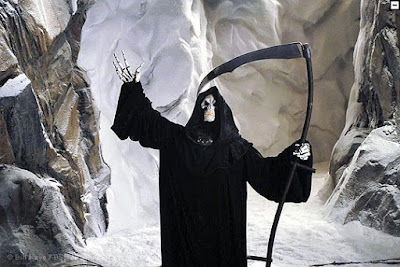 |
| A boy learns to face his fears (© Focus Features) |
In the book Uses of Enchantment, Bruno Bettelheim lays out a psychological argument that fairy tales are useful in helping young children understand adult fears. Fairy tales are couched in childlike verse, but beneath the surface lies deeper, troubling psychological truths.
For example, why is every stepmother in fairy tales evil? Well, according to Bettelheim it is because it is all about the fear children have that our parents don't love us. But. This is too much to bear for the children, so the storyteller replaces this fear with a substitute - the stepmother.
In J.A. Bayona's fantasy flick, A Monster Calls, the logic works similarly. However, the metaphor is not as thickly veiled. There are no evil stepmothers; but, there is a strident grandmother (Sigourney Weaver).
The story, based on a novel of the same name by Patrick Ness, centers on a young boy named Conor (played sensitively by Louis MacDougall), a waifish boy attuned to the visual arts but prone to being bullied at school. He is dealing with the impending tragedy of his mother's death.
While his family seemingly falls apart all around him, Conor falls deeper and deeper into a sullen depression. In one scene, he destroys his grandmother's sitting room, tearing the furniture apart. The boy is distraught and anger is an easy anodyne.
In order to help Conor deal with the reality of his grief, every night around midnight an anthropomorphic yew tree monster voiced by Liam Neeson) uproots itself from a nearby cemetery to dole out three fairy tales to the lad. The tales - à la Bettelheim - are meant to help the young boy deal with the very real fear of his mother's death.
That's all fine and dandy. There are lots of films and books that help children deal with the reality of death - take My Girl and Bridge to Terabithia as potent examples.
A Monster Calls is a little different because the plots rend open a deeper and more destructive fear. The inevitable death of Conor's mother also triggers within Conor a kind of death drive. The yew tree monster's stories are meant to help the boy realize his own wish to die and to counteract this drive with a life-giving "yes" living.
So it's intense material. I won't go into the content of the tales - but suffice it to say the film's visuals are stunning and I think the movie succeeds in driving home its central psychological thesis.
I am not one to censor films; however, I would caution against viewing this film with young children. I think the deeper themes of destruction and not-so-subtle hints about suicidal ideation should give parents pause. However, if parents know the content of the film deals with these themes, it could prove to be an enriching experience for both child and adult.
If Bettelheim is right, then fairy tales are meant to ease the more horrific facts of life - death, murder, suicide, decay, entropy, and estimated taxes - and, thus; films just may be our twenty-first-century version of sixteenth-century Grimm's fairy tales.
A Monster Calls (2016)
Focus Features
Directed by J.A. Bayonna
Starring Sigourney Weaver, Liam Neeson, Felicity Jones, and Lewis McaDougall
Written by Patrick Ness (Screenplay) and based on his book.


